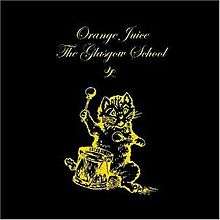The Glasgow School
The Glasgow School is a compilation album by the Scottish band Orange Juice, released in 2005. It contains the band's four singles for Postcard Records, the greater part of the 1992 compilation album Ostrich Churchyard (which contains early versions of tracks that later appeared on the 1982 album You Can't Hide Your Love Forever), an alternate version of "Simply Thrilled Honey", and a cover of "I Don't Care" by the Ramones. This material was all recorded between 1978 and 1981, prior to the band signing with Polydor Records.[4]
| The Glasgow School | ||||
|---|---|---|---|---|
 | ||||
| Compilation album by | ||||
| Released | 9 August 2005 | |||
| Genre | Post-punk | |||
| Length | 62:43 | |||
| Label | Domino | |||
| Orange Juice chronology | ||||
| ||||
| Review scores | |
|---|---|
| Source | Rating |
| AllMusic | |
| Blender | |
| Pitchfork Media | (9.3/10)[3] |
Track listing
All tracks composed by Edwyn Collins; except where indicated
- "Falling and Laughing" – 4:00
- "Moscow" (James Kirk) – 2:01
- "Moscow Olympics" (James Kirk) – 2:07
- "Blue Boy" – 2:53
- "Love Sick" – 2:27
- "Simply Thrilled Honey" – 2:43
- "Breakfast Time" – 1:56
- "Poor Old Soul (Part 1)" – 2:29
- "Poor Old Soul (Part 2)" – 2:36
- "Louise Louise" – 2:50
- "Three Cheers For Our Side" (James Kirk) – 2:52
- "In A Nutshell" – 4:06
- "Satellite City" – 2:42
- "Consolation Prize" – 3:10
- "Holiday Hymn" (Vic Goddard) – 3:00
- "Intuition Told Me (Part 1)" – 1:13
- "Intuition Told Me (Part 2)" – 3:22
- "Wan Light" (James Kirk) – 2:30
- "Dying Day" – 3:09
- "Texas Fever" – 1:44
- "Tender Object" – 4:40
- "Blokes on 45" (James Kirk) – 4:13
- "I Don't Care" (Douglas Colvin, Jeffrey Hyman, John Cummings, Tom Erdelyi) – 3:08
Personnel
- Orange Juice
- Edwyn Collins
- James Kirk
- David McClymont
- Steven Daly
gollark: Go making all loops `for` (WHY DOES IT DO THAT) doesn't make it much simpler, since you still have to *know* all the weird ways to use it and so does the compiler.
gollark: I mean, that's not a thing of *keywords*, just of... more language features, really.
gollark: More keywords → more complexity in the language/parsing/whatever, more stuff programmers have to know.
gollark: For all (values of) f there exists a (value) g such that f (x, y) = (g x) y. In other words, you can convert any function which takes two values as a tuple or something to a curried one. I think.
gollark: I knew it would eventually be useful setting that as my status!
References
This article is issued from Wikipedia. The text is licensed under Creative Commons - Attribution - Sharealike. Additional terms may apply for the media files.